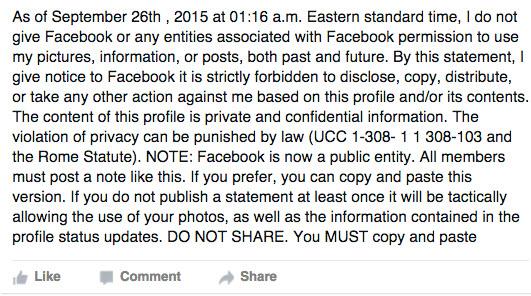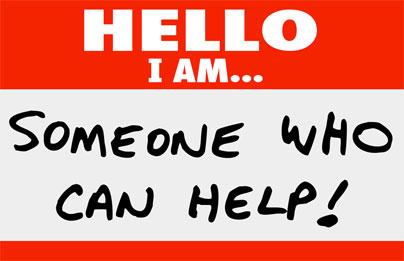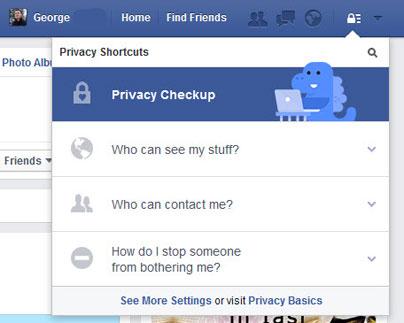With more than a billion active users, it comes as no surprise that lots of people who are on Facebook take myth for fact and, because they don’t know any better, fall for hoaxes like “Facebook will start charging you”.
Here’s a look at some Facebook myths you’ve probably heard over time, myths that some people still believe in. It’s best to know what’s myth and what’s truth so you can avoid hoaxes, avoid visiting a malware spreading site, and most of all, avoid annoying your Facebook friends.
1. Facebook will start asking for money

Facebook is free right now, but as the social network grows ever more popular, it might start charging us. After all, keeping Facebook up and running comes with all sorts of costs, so it makes sense to start charging the users. Right? Wrong!
Facebook is free and will always be free. Facebook is committed to keeping the social network free for everyone.
And if you want to get technical about it, Facebook doesn’t even need your money. You see, it makes money from advertising, from the sponsored ads you see on the social network. Here are some figures to put things in perspective. Facebook's total revenue for 2014 was $12.466 billion while its net profit was $2.94 billion. Facebook made close to 3 billion dollars in profit from ads in 2014 alone. Let that sink in for a moment.
Whenever someone tells you that Facebook will start charging for a subscription or asking for your money, set him straight.
2. Facebook owns what you post

Copyright posts like this one or similar to this one have been around for years. The interesting thing is that they’re currently regaining popularity, spamming news feeds around the world.
People believe that Facebook owns whatever they post to the social network. And worst of all, they believe that a copyright status like the one above will protect their posts. Posting things like that shows two things:
Not that you read them anyway. Nobody reads the terms and conditions.
Such a copyright post is meant to address a non-existent problem. Facebook doesn’t own your posts and doesn’t want the copyright to your photos, status updates, and all the other things you post to the social network.
Even if it did want to own your stuff, posting something like this doesn’t change the fact that you agreed to the social network’s terms of service when you created an account. Posting a copyright status doesn’t retroactively negate any of the privacy or copyright terms you already agreed to. Your legal rights are determined not by what you post, but by the terms of service you agreed to.
On a lighter side, here’s Last Week Tonight's host John Oliver talking about how silly copyright posts are.
3. You can find out who viewed your profile, others can tell that you viewed their profile

There are tons of applications and browser extensions out there that promise to show you who visits your Facebook profile, who takes a look at your timeline. They all promise the impossible. If you come across a 3rd party app that promises to offer something like this, you should report it.
The app won’t work because it can’t work! Facebook doesn't let you track who views your profile or your posts.
Or worse, it may be a scam, a way to get you to install dangerous software on your computer. After all, the bad guys are willing to do anything to infect your PC. Speaking about the bad guys, Intel Security released a list of the top 10 most dangerous celebrities to search for online. I invite you to check it out.
Assuming your ex hasn't blocked you, go ahead and stalk her all you want. She’ll be none the wiser. The myth that people can tell who visited their profile is just as false as the myth that you can see who access your profile. Facebook does not let people track who views their profile. Apps that promise to do so, promise the impossible. If you come across such an app, you should report it.

Myths about Facebook are so common that the social network set up a special Common Myths About Facebook page on its Help Center. It addresses questions like “will Facebook ever charge for service?” or “does Facebook sell my information?”
The Facebook Privacy Basics page does a proper job of explaining how Facebook works and what you can do to protect your privacy. It presents the steps you must take to control who can see your posts, manage how other Facebook users can interact with you, customize what shows up in your news feed, and how to protect your account.
Visit the Facebook Terms and Policies page to learn about lots of things, like how Facebook uses the information it receives, what sort of content is not allowed on the social network, how ads are reviewed, and more.
Manually go over your privacy settings. Access your Facebook account and click the padlock icon from the right hand corner. You’ll be able to run a privacy checkup, choose who can see your posts, choose who can contact you, and more.

Don't agree to anything without reading it first
Facebook’s Terms of Service are listed here. But since you don’t speak legalese and you don't want to waste time on reading so much legal mumbo-jumbo, I have a tip for you.
BrightFort has an application that can analyze license terms and tell you if there’s something you should be worried about. The application in question is called EULAlyzer and is available for download right here on FindMySoft.
Here’s a look at some Facebook myths you’ve probably heard over time, myths that some people still believe in. It’s best to know what’s myth and what’s truth so you can avoid hoaxes, avoid visiting a malware spreading site, and most of all, avoid annoying your Facebook friends.
1. Facebook will start asking for money

Facebook is free right now, but as the social network grows ever more popular, it might start charging us. After all, keeping Facebook up and running comes with all sorts of costs, so it makes sense to start charging the users. Right? Wrong!
Facebook is free and will always be free. Facebook is committed to keeping the social network free for everyone.
And if you want to get technical about it, Facebook doesn’t even need your money. You see, it makes money from advertising, from the sponsored ads you see on the social network. Here are some figures to put things in perspective. Facebook's total revenue for 2014 was $12.466 billion while its net profit was $2.94 billion. Facebook made close to 3 billion dollars in profit from ads in 2014 alone. Let that sink in for a moment.
Whenever someone tells you that Facebook will start charging for a subscription or asking for your money, set him straight.
2. Facebook owns what you post

Copyright posts like this one or similar to this one have been around for years. The interesting thing is that they’re currently regaining popularity, spamming news feeds around the world.
People believe that Facebook owns whatever they post to the social network. And worst of all, they believe that a copyright status like the one above will protect their posts. Posting things like that shows two things:
- You’re gullible.
- You don’t understand how terms of service work.
Not that you read them anyway. Nobody reads the terms and conditions.
Such a copyright post is meant to address a non-existent problem. Facebook doesn’t own your posts and doesn’t want the copyright to your photos, status updates, and all the other things you post to the social network.
Even if it did want to own your stuff, posting something like this doesn’t change the fact that you agreed to the social network’s terms of service when you created an account. Posting a copyright status doesn’t retroactively negate any of the privacy or copyright terms you already agreed to. Your legal rights are determined not by what you post, but by the terms of service you agreed to.
On a lighter side, here’s Last Week Tonight's host John Oliver talking about how silly copyright posts are.
3. You can find out who viewed your profile, others can tell that you viewed their profile

There are tons of applications and browser extensions out there that promise to show you who visits your Facebook profile, who takes a look at your timeline. They all promise the impossible. If you come across a 3rd party app that promises to offer something like this, you should report it.
The app won’t work because it can’t work! Facebook doesn't let you track who views your profile or your posts.
Or worse, it may be a scam, a way to get you to install dangerous software on your computer. After all, the bad guys are willing to do anything to infect your PC. Speaking about the bad guys, Intel Security released a list of the top 10 most dangerous celebrities to search for online. I invite you to check it out.
Assuming your ex hasn't blocked you, go ahead and stalk her all you want. She’ll be none the wiser. The myth that people can tell who visited their profile is just as false as the myth that you can see who access your profile. Facebook does not let people track who views their profile. Apps that promise to do so, promise the impossible. If you come across such an app, you should report it.

Myths about Facebook are so common that the social network set up a special Common Myths About Facebook page on its Help Center. It addresses questions like “will Facebook ever charge for service?” or “does Facebook sell my information?”
The Facebook Privacy Basics page does a proper job of explaining how Facebook works and what you can do to protect your privacy. It presents the steps you must take to control who can see your posts, manage how other Facebook users can interact with you, customize what shows up in your news feed, and how to protect your account.
Visit the Facebook Terms and Policies page to learn about lots of things, like how Facebook uses the information it receives, what sort of content is not allowed on the social network, how ads are reviewed, and more.
Manually go over your privacy settings. Access your Facebook account and click the padlock icon from the right hand corner. You’ll be able to run a privacy checkup, choose who can see your posts, choose who can contact you, and more.

Don't agree to anything without reading it first
Facebook’s Terms of Service are listed here. But since you don’t speak legalese and you don't want to waste time on reading so much legal mumbo-jumbo, I have a tip for you.
BrightFort has an application that can analyze license terms and tell you if there’s something you should be worried about. The application in question is called EULAlyzer and is available for download right here on FindMySoft.

























